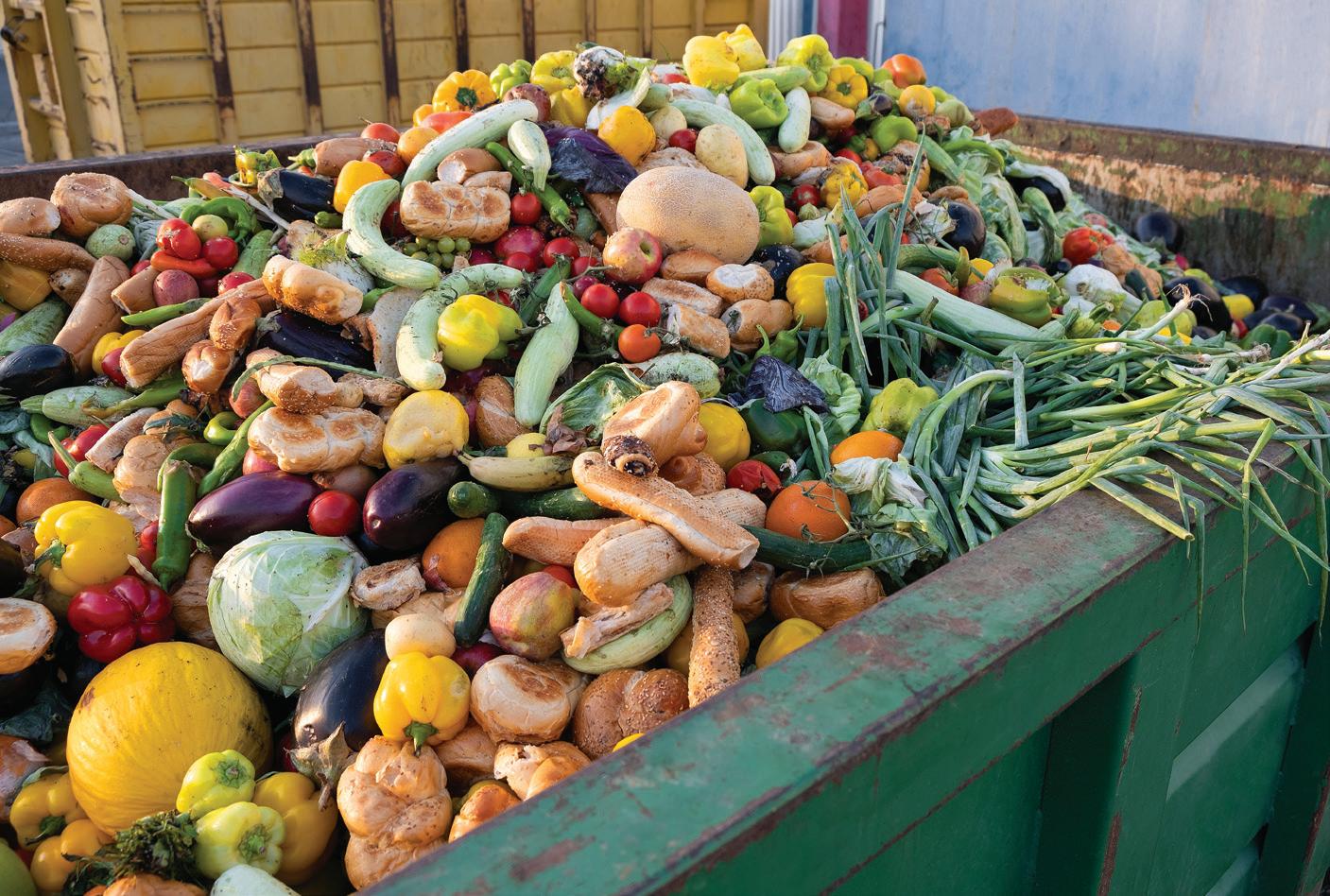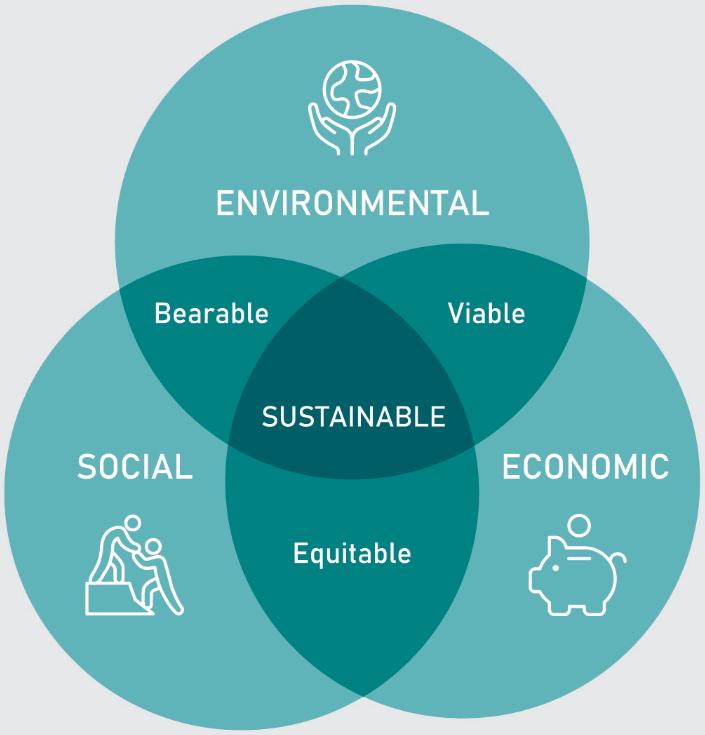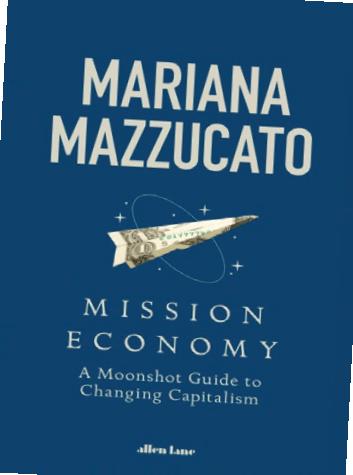The growing scandal of food in landfill

PLUS

Dynamics of globalisation Parag Khanna redraws the world map Weather warnings Threats to critical national infrastructure Legal logjam Will environmental law survive the 'Brexit bonfire'?
Transforming the world to sustainability
IRANSFOR FOR ENVIRONMENT AND SUSTAINABILITY PROFESSIONALS
IEMA Environment • Economy• Society• Feb/Mar 2023 iema.net/transform
Our in-house team of IEMA and IOSHapproved tutors support your learning

Our in-house support team provide assistance 7 days a week for customers

Our courses are 100% online and can be started immediately You get a dashboard that enables course completions to be monitored
Our courses work on PCs, tablets and smartphones (internet access required) We are rated 'Outstanding' by IOSH and score 4.84 out of 5 on reviews.co.uk
 byHSQE
byHSQE
IOSH, IEMA, RoSPA, IATP & CPD approved/ assured courses available for an immediate start

I I 0:zr-O
VitalSkills
Approved
Approved
training centre
training provider 980
CONTENTS
Feb/Mar 2023
UPFRONT
04 Comment
Sarah Mukherjee addresses the urgent need for adaptation
05 News roundup and IEMA news
All the latest news and updates
08 IEMA Opinion
Tom Pashby finds members' sustainability predictions for the year ahead surprisingly optimistic
09 IEMA Futures
Fin Whitehouse assesses the UK's foray into geothermal
10 Legal brief
Regulations, consultations and court news explained
CONNECT
34 Career profile
Edwina White, environment and consenting manager for development-phase Irish offshore wind farm projects, DP Energy Group
35 Events
Dates for your diary, including a digital workshop to kick-start your journey to full membership, a biodiversity webinar and the Futurebuild 2023 conference
FEATURES
12 Interview: Dr Parag Khanna

The founder of FutureMap assesses the future of human geography in a climate-disrupted world
16 Food waste
David Burrows reports on the food waste scandal and explores the measures required to combat it

19 Greenhushing
Why are some companies downplaying their sustainability credentials?
20 Emissions
The chemical industry faces a perfect storm of sustainability challenges on the road to net zero, says Roger Wareing
22 The big challenges
IEMA's policy team outline key issues for environment and sustainability professionals, from inflation to high workloads
25 Economics
Mariana Mazzucato tells Chris Seekings about the need for a radical rethink of the role of governments in society

28 Critical infrastructure
Huw Morris explains why the UK government needs a more joined-up approach to keeping critical national infrastructure safe during extreme weather events

31 Opinion
Guilherme Azevedo reflects on inequality as the root cause of global warming and climate injustice
32 Legal
Neil Howe assesses the potential harmful impact of the UK's Retained EU Law Bill
iema.net/transform
25
28 Feb/Mar 2023 TRANSFORM 3
IEMA
SARAH MUKHERJEE MBE, CEO, IEMA

Fundamentals of climate change action
ello, and welcome to another edition of Transform. The lessons and progress from COP27 have been well and truly digested, and in this issue we have a fascinating collection of comment and articles that speak to the fundamentals of climate change action.
At every COP there are passionate and articulate delegates from island states, challenging other countries to mitigate before these fragile places disappear. Climate change scientists say they are right to be so concerned and, according to Dr Parag Khanna, the futurologist and founder of FutureMap, these islands will disappear in the future, and moreover there will be other nations that will be unable to function as countries. This will have devastating consequences. Dr Khanna argues that there will be another wave of mass migration -but this must be seen in the context of human movement that has taken place for millennia, since well before the advent of the nation state.
The three pillars on which much of the COP process is based are adaptation, mitigation and more equitable financial distribution. However, a major parliamentary inquiry in the UK has highlighted how little attention, relatively speaking, policymakers give to adaptation, and how urgent the situation is becoming, given that climate change is making the conditions in which we expect infrastructure to operate successfully all the more uncertain. Huw Morris has been investigating.
As we emerge from several weeks of over-indulgence, the amount of waste that the festivities bring starts to hit home, and never more so than on food waste. Reducing food waste has been something that I have considered in almost every stage of my career, from presenting Farming Today to sitting on the advisory panel of the National Food Strategy. Being able to derive maximum nutrition from the food we buy is all the more important with a cost-of-living crisis in Europe; David Burrows looks at what the UK is doing to reduce the amount of food that ends up in the bin.
We hope you enjoy this issue and we welcome your feedback and suggestions. Please do get in touch if there is anything that you would like to see featured in the magazine.
Transforrningtheworld to sustainability
IEMA is the professional body for everyone working in environment and sustainability. We provide resources and tools, research and knowledge sharing along with high quality formal training and qualifications to meet the real-world needs of our members. We believe that together we're positively changing attitudes to sustainability as a progressive force for good.
!EMA
The Old School House. Dartford Road, March, PE15BAE tel +44 (0) 1522 540069
info@iema.netIwww.iema.net
Editor Sharon Maguire s.maguire@iema.net
Deputy editor Christopher Seekings c.seekings@iema.net
Sub-editor
Caroline Taylor
Group managing editor
Sian Campbell

Group art director
Jes Stanfield
Commercial director Michael Coulsey 020 3771 7232
MichaeLcoulsey@thinkpublishing.co.uk

Production director
Justin Masters
Client engagement director
Melissa Michael Executive director John Innes
Printer Zenith Print and Packaging Ltd
Published by Think 20 Mortimer Street. London, W1T 3JW www.thinkpublishing.co.uk 020 3771 7200
0© IEMA 2023
This magazine aims to include a broad range of opinion and articles that do not necessarily reflect the views of IEMA; nor should such opinions be relied upon as statements of fact

The income generated from advertising included in Transform goes towards the production and distribution costs of the magazine, leaving more of your membership fee to help us in our mission to transform the world to sustainability.
All rights reserved. No part of this publication may be reproduced, transmitted in any form or by any means, electronic, mechanical or otherwise, without the prior written consent of the publisher and editor.
ISSN14727625
The paper used to print Transform comes from sustainable sources.

Comment
4 TRANSFORM Feb/Mar 2023
"Amajor parliamentary inquiry in the UK has highlighted how little attention, relatively speaking, policymakers give to adaptation, and how urgent the situation is becoming"
(\,recycle iema.net/transform
ROUNDUP
EID
Cost-of-living crisis risks undermining climate action, according to WEF
The cost-of-living crisis is the greatest short-term risk facing the world, and threatens to undermine efforts to tackle climate change, which is the biggest long-term risk, according to the World Economic Forum's Global Risks Report 2023.
Failure to mitigate and adapt to climate change, natural disasters and biodiversity loss are among the top five risks for the next decade identified in the report, while the cost of living, extreme weather and geoeconomic confrontation are the top three risks for the next two years.
The report argues that the window for action on climate change is closing rapidly. John Scott, head of sustainability risk at Zurich Insurance Group, said: "If we speed up action, there is still an opportunity by the end of the decade to achieve a 1.5°C degree trajectory and address the nature emergency."
Read the full report at bit.ly/Global_Risks_Report
BUSINESS AND INDUSTRY
Greenwashing growing increasingly sophisticated, think tank study finds
Corporate greenwashing is becoming increasingly sophisticated, according to a new report by the think tank Planet Tracker. It identifies six forms of greenwashing: greencrowding, greenlighting, greenshifting, greenlabelling, greenrinsing and greenhushing. These range from marketing a product inaccurately to intentionally distracting from damaging environmental policies.
John Willis, director of research at Planet Tracker, said that addressing the problem will require a new framework for identifying greenwashing. He added: "By identifying the various iterations that greenwashing comes in, we hope to enable investors and consumers to be more mindful when making environmentally led decisions."

Read more about the six forms of greenwashing at bit.ly/Planet_ Tracker_report

THE ECONOMY
Climate change damaging global labour markets
Global warming is already having a detrimental impact on worker productivity, labour markets and economic growth, according to a study by the London School of Economics and Political Science (LSE).
The findings show that working hours and labour capacity have fallen due to a warming climate, particularly in tropical regions, with implications for GDP,health, absenteeism and labour rights. In contrast, cooler countries are currently experiencing benefits from warming, exacerbating inequalities between the Global North and South, especially for vulnerable groups.
The findings suggest that we could see a rise in economic migration due to climate change this year. Read the full LSEreport at bit.ly/31TrtQU
REGULATIONS AND STANDARDS
New year, new rules
IEMA's deputy CEO, Martin Baxter, outlines the key regulations and standards to look out for in 2023
Important decisions will be made in 2023 on new laws and regulations that will shape environment and sustainability practice. Some of the main mechanisms in the Environment Act 2021 will come into effect -the delayed long-term targets in the areas of biodiversity, water, air quality, and resource efficiency and waste will be set through statutory instrument and will dictate the direction of travel for the next 15 to 20 years. Biodiversity net gain for new development will also come into effect, requiring new development projects to achieve a 10% increase in biodiversity, either through on-site or off-site enhancements.
Changes are also proposed to the Environmental Impact Assessment and Strategic Environmental Assessment regimes through the Levelling-up and Regeneration Bill. Currently being considered in the House of Lords, the Bill is likely to gain Royal Assent later in 2023, although regulations will not be implemented until 2024 at the earliest, following consultation, which was due to launch in January.
One of the significant uncertainties from an environmental law perspective is whether the Retained EU Law Bill gains Royal Assent and, if so, what timescale will be required for the revocation, or reconfirmation, of EU-derived legislation. Definitely one to watch.
From a standards perspective, 2023 will see a decision on whether the global environmental management system standard ISO 14001 will be amended or revised. Given the significant number of users -over 420,000 accredited certificates (and many more organisations that aren't certified) -this is not a decision that is being taken lightly. We will keep IEMA members informed and, if changes are to be made, we will offer a range of engagement opportunities.
ENVIRONMENT & SUSTAINABILITY NEWS AND VIEWS
iema.net/transform
Feb/Mar2023 TRANSFORM5
IWA 42: Restating the obvious or a crackdown on green wash?
The International Organization for Standardization launched its new IWA 42 Net Zero Guidelines at COP27. Billed as a common reference for net-zero guidance, it is essentially a rulebook on terminology and actions.

While it took decades for scientists and other observers to convince the rest of society that human-created carbon emissions were having a detrimental impact on the environment, most politicians and business leaders now claim that they are directing their resources towards net zero.
Often these claims are genuine but some are patently not true and it has not always been clear which are which. Investors and consumers can find it difficult to sift through the position statements and be certain they are allocating their finances in ways that truly align with the outcomes they want to see.
In response, several overarching initiatives have sprung up; a quick internet search for 'net-zero initiative' reveals a number of partnerships between national governments, large organisations and academia. Each offers a set of principles and practical tools, and many enable organisations to make pledges and report on progress.
The ISO Guidelines seek to address
the fragmented net-zero governance landscape that has emerged as a consequence, by creating a common set of definitions for planning for net zero and measuring progress. Put together by more than 1,200 experts from over 100 countries (including representation from IEMA), the workshops enabled a wide range of representatives to agree on a set of definitions that everyone could live and work with.
The nature of the process means that, overall, the guidance substantively repeats existing guidance.
PUBLICATIONS
More detail in health impact assessment guidance
IEMA has published two new impact assessment guides: Effective Scoping of Human Health in Environmental Impact Assessment, and Determining Significance for Human Health in Environmental Impact Assessment.
IEMA practitioners identified that existing guidance in these areas did not give sufficient detail for the consideration of health as part of an environmental impact assessment (EIA). The two new guides were developed by IEMA's Impact Assessment -Health
Working Group, which is comprised of leading EIA professionals and key stakeholders from public health organisations from England, Wales, Scotland, Northern Ireland and the Republic of Ireland.
The aim of the scoping guide is to enable those commissioning, conducting or reviewing an EIA to determine the relevant health issues. It focuses on clarifying the information to include in an applicant's Scoping Report. It also supports public health stakeholders in engaging and responding.
The new guidance provides a clear definition of what is within the scope of human health. This includes explaining the range of issues that can be relevant within an EIA, including health protection, health
promotion and healthcare service considerations. Physical, mental and social dimensions of health are considered, as well as health inequalities. This holistic approach to health is fundamental to a public health understanding of how a project affects the environment.
The aim of the second guide is to explain what 'significance' means for 'human health' as an EIA topic. It explains how human health significance relates to the degree and context of changes in population health, including effects to vulnerable groups. This is explained with reference to public health evidence sources and consistent judgement criteria.
Visit bit.ly/EIA_guidance for further details and to download the guides
IEMANews 6 TRANSFORMFeb/Mar2023
iema.net/transform
While not changing the spirit of existing guidance, it does change the letter. The new guidance closes a loophole enabling a company to publicly state its net-zero transition ambitions while being a member of a trade group that lobbies against changes to business as usual. This hands climate activists of all types, from street
campaigners to activist shareholders, the tools for highlighting instances where a country or company says one thing and does another.
Do the guidelines restate the obvious? Yes, they do. Are they a long-overdue crackdown on greenwash? Let's hope so. Visit www.iso.org/netzero for details and to see the guidance in full
Sign up to the Nature Positive Business Pledge
!EMA has been working with the UK Business and Biodiversity Forum, the RSPB, the Aldersgate Group and the International Chamber of Commerce to create a Nature Positive Business Pledge. The aim of the Pledge is to create a set of principles and a framework of actions to support businesses to reduce their impacts on nature and to work in a nature-positive way.
Business relies on nature directly and indirectly. Nature losses and gains are material to business. The Nature Positive Business Pledge invites companies to join a network of businesses that are committing to make changes in their operations to reduce impacts and support recovery for nature.

Pledge signatories are asked to:
• Act using a set of good practice principles, including the mitigation hierarchy and additionality
• Assess impacts on nature and prioritise where action is required
Improving land use in England
An influential Lords Committee has recommended the establishment of a new commission in England to improve decisions and processes determining how land is used.
The focus of the commission would be to develop a framework to guide stakeholderslandowners, managers and other decision-makers -in their decisions on land use, in relation to, for example, food production, nature restoration, housing, infrastructure, and so on.
In reaching this conclusion, the Land Use in England Committee ran an inquiry in 2022, with a range of experts and organisations feeding in. IEMA CEO Sarah Mukherjee MBE provided insights at one of the Committee's oral evidence sessions.
The key for IEMA is for any land use framework to take a holistic approach to environmental protection and enhancement, i.e. one that goes beyond narrowly defined interpretations of 'nature'. Further still, appropriate skills and resources need to be in place to properly integrate biodiversity and natural capital considerations into decision-making.
In its final report, which was published in December, the Committee also recommended that government set out more detail in relation to how Environmental Land Management Schemes will work in practice. The case for the effective development of Local Nature Recovery Strategies (LNRS)and the role that they could play in engaging communities in decisions concerning land use is also made in the report.
It is important to recognise that the majority of the Committee's report is focused on land use outside the conventional planning system. It remains critical that there is legalisation and policy in place that ensures effective environmental impact assessment is a key component of development. This is something that IEMA continues to champion. For more details of the Lords' Land Use Committee's report, visit bit.ly/Land_Use_report
• Identify and set suitable SMART targets
• Roll out costed and ordered actions and monitor and measure the outcomes
• Report transparently every year
• Continuously build on and step up nature positive actions
• Share their learnings to support other companies.
The Pledge does not specify a methodology and takes a high-level approach to allow businesses of all sizes and sectors -no matter what stage they are at in their impacts management -to commit to iterative improvements.
To sign up or to find out more, visit bit.ly/Nature_Positive_ Business_Pledge
Hftimm@
iema.net/transform
Feb/Mar 2023 TRANSFORM 7
Professionals working in environment and sustainability know it's impossible to predict the future, especially relating to trends in our sector. With that in mind, I asked IEMA members to send me their thoughts on what we can expect to see in 2023 -a steep challenge.
In 2023, we mark the first full year of the Russian invasion of Ukraine, the third year of Covid-19 and the 28th Conference of the Parties to the United Nations Framework Convention on Climate Change.
We are five decades into the mainstream Western environmental movement and we have just seven years left to dramatically change the way our economies operate if we're to avoid cataclysmic climate breakdown, according to the Intergovernmental Panel on Climate Change.
At the start of 2023, the UK House of Commons Environmental Audit Committee called for a "war effort" in ramping up the UK government's action on sustainable energy security following the Russian president's use of gas supplies as a lever of war. IEMA members told me they believe 2023 will be a major year for energy efficiency in the built environment, both from a corporate and bottom-up approach, as well as a top-down, policy-driven area of work.
We will also see significant advances outside the purely energy and climate space. Defra rules on biodiversity net gain will come into effect following the implementation of the Environment Act. Developers will be forced to prove they take their impact on biodiversity into account and are benefiting the natural world.
More companies are already choosing to act on social issues and wider sustainability challenges such as governance, cybersecurity and supply chains. ESG (environmental, social and corporate governance) has seen an explosion in activity over the past couple of years, with everyone from asset managers to plant hire service providers committing serious money and time into pushing for sustainability.

One thing I was surprised by when reading comments from members was the high levels of optimism. The living world faces massive challenges, yet in the face of the task ahead of us, IEMA members chose hope. I think this is
because we know the incredible volume and variety of work going on both in public and behind the scenes to transform the world to sustainability.
I have written previously of my pessimism about the climate and biodiversity crises. That doesn't detract from the fact that every increment of global heating which we avoid by acting now means that more of the planet remains habitable for future generations.
As I write this, over the past few days I have seen dozens of news reports and videos on TikTok of people living on the west coast of the US experiencing extreme weather, washing away their homes. Reacting to a raging torrent of water near her home, American talk show host Ellen DeGeneres said: "We need to be nicer to mother nature, because mother nature is not happy with us."
For years, people in the Global South have been experiencing these events, like the extreme flooding which saw one third of Pakistan under water last year, and rising
sea levels encroaching on small island nations, which are the least responsible for the climate emergency.
At the end of 2023, COP28 will be held in the United Arab Emirates, a petro-state whose wealth derives almost entirely from its oil and gas industry. The president of COP28, HE Dr Sultan Al Jaber, is also the head of the UAE's national oil company. This is the first time in COP's history that it will be chaired by an oil boss.
Holding the world's foremost climate summit in a nation dependent on revenue from fossil fuels is an excellent illustration of the situation we face. Continuing to rely on polluting energy sources that have brought a relatively small number of people untold riches while simultaneously trying to build a global society that is a net-zero greenhouse gas emission polluter will be the challenge of the year and for decades ahead.
TOM PASHBY, AIEMA, is a digital journalist at IEMA

IEMA Opinion
Despite the world's challenges, IEMA members are surprisingly optimistic about 2023, finds Tom Pashby
8 TRANSFORM Feb/Mar 2023
"[IEMAmembers] know the incredible volume and variety of work going on both in public and behind the scenes to transform the world to sustainability"
iema.net/transform
THE UK TAPSINTO GEOTHERMAL
Fin Whitehouse examines the revolutionary energy project set to take Cornwall into a new industrial era
A!most two years ago, a plume of steam could be seen rising into the fresh Cornish air, a sign of what is promised to be a breakthrough energy project. Formerly one of the greatest copper mining regions in the world, Cornwall is entering a new industrial era -replacing Cornish copper with constant low-carbon electricity.
The United Downs Deep Geothermal Power project is being developed by Geothermal Engineering and has received funding from the European Regional Development Fund and Cornwall Council. The project is a power plant that uses hot rocks to produce electricity and heat, otherwise known as 'geothermal power generation'. This now orthodox method of energy production has been deployed in volcanically active areas of the globe but not yet in the UK. To produce geothermal power, the United Downs power plant will:
• Use two wells drilled into the granite of the Porthtowan Fault Zone
• Pump water from the deepest well (5,275ml where temperatures are anticipated to be 180°C
• Feed the steam produced through a heat exchanger
• Convert the extracted heat into electricity
• Reinject water into the second well to capture more heat.
This cycle then continues, producing constant low-carbon electricity for the
grid as well as heat for up to 10,000 people at the new Langarth Garden Village, another exciting project in itself that will establish a new distinctive, green and sustainable community.

On Thursday 1 July 2021, plans were announced to build four more geothermal sites in Cornwall by 2026. Not only will this provide a low-carbon source of electricity, it also has the potential to produce hundreds of green jobs in one of the most deprived areas of southern England. Opportunities for jobs can be found in sectors such as construction, exploration, technology, drilling and maintenance. At a time when the UK is crying out for green jobs and homegrown energy resources, is geothermal power generation an untapped resource?
There is certainly potential. It has been posited that geothermal power generation could meet approximately 20% of the UK's energy demand. One only needs to look at countries with similar thermal resources as the UK -such as, France and Germany -to see the merit in geothermal. This claim is only bolstered by progressions in Enhanced Geothermal System technologies, which can facilitate geothermal development beyond traditional hydrothermal regions. There are a number of locations within the UK with high potential for geothermal power generation, such as Cheshire and Staffordshire.
In countries such as France and Germany, geothermal energy has been shown to offer technical advantages as well as environmental and economic ones. Geothermal energy is not dependent on weather conditions and can therefore deliver baseload energy, which will assist in balancing more intermittent power generation from renewable sources such as solar or wind. Furthermore, in comparison with other renewable and non-renewable energy sources, geothermal has a small land area footprint and a prolonged lifespan.
The benefits and potential are explicit, so what is the delay?
A research briefing from the UK parliament in 2022 stated that there is a lack of information about the application of the technology in the UK, which means that the energy source is not currently considered within the UK's carbon budget or government strategies. If we wish to see a wider roll-out of geothermal, long-term government support is required to develop demonstration projects and expand the industry. As seen in other sectors, such as offshore wind and low-carbon hydrogen, there needs to be a market framework for geothermal technologies that sets ambitious targets and subsidies which could contribute to rapid cost reductions for geothermal energy systems. However, at present, high upfront capital costs and the geological risk of not achieving the required temperatures or water flows present major barriers.
The introduction of geothermal into the UK's energy mix by the United Downs Project could prove defining for a UK energy industry that has spent the past 12 months in crisis mode and could prompt a necessary expansion of the industry. Whether this will be the case, only time will tell.
FIN WHITEHOUSE, GradlEMA, is a graduate specialist and scientist at Arcadis
IEMA Futures
iema.net/transform
Langarth Garden Village will be a sustainable community in Cornwall, housing up to 10,000 people. It will be heated by the United Downs Deep Geothermal Power Plant
Feb/Mar 2023 TRANSFORM 9
First Variable Monetary Penalty served by SEPA for landfill odours at Glasgow site
Alandfill site in Due to the proximity to the site communities, which was communities, and we take Glasgow has been boundary, SEPA advised that evidenced by odour complaints very seriously. served with a civil maximum controls were assessments by SEPA officers. We tried to work with penalty fine of required to manage odours by SEPAissued Paterson's of Paterson's of GreenoakhiU Ltd £6,200 following a breach of the landfill operator. GreenoakhiU Ltd a Variable to address the issues and its environmental permit A month later, the operator Monetary Penalty (VMP),the secure compliance but were which resulted in the release began depositing waste in first in Scotland served by unsuccessful. We believe a of odours that affected local the new area which led to a SEPA, of £6,200 and ordered VMP is the appropriate course communities over a period of change in the odours them to pay £1,156.35 costs. of action in this case. eight days in June 2021 and reported, with the majority VMPs are discretionary "The eight-day period of saw 138 complaints. being a rotten waste/bin financial penalties which odour the community had to Site visits conducted by the smell. SEPA asked the SEPA can impose for an deal with was significant and Scottish Environment operator to implement extra offence following an was due to a lack of reasonable Protection Agency (SEPA)in measures to control the smell. appropriate investigation. care by the operator. It chose March 2021 identified Between 8 and 15 June 2021, SEPKs Greater Glasgow and to dispose of waste in an area concerns that a new tipping the site breached its Clyde unit manager, Pamela significantly closer to housing area at the landfill site, known environmental permit on five Armstrong, said: "SEPA than previously, and as the Cell 10 Extension, was separate occasions, causing acknowledges the impact continued to do so throughout close to domestic properties. severe impact on local odour can have on the eight days, despite being

Legal
cedrec b
notified by SEPA that offensive odours were being recorded off-site. The site was initially informed by SEPA on 9 June 2021 that failure to act to prevent odour from leaving the site would result in a significant event.
"We hope the £6,200 penalty imposed, plus payment of SEPA's costs, demonstrates SEPA's commitment to take proportionate enforcement action when operators fail to comply with conditions of their permit to operate. VMPs are a new tool in our kit and we will not hesitate to use them when appropriate."
authority was entitled and expected to give significant weight to the advice of an expert national agency with relevant expertise in nature conservation, such as Natural England. Although the authority could lawfully disagree with, and depart from, such advice, it had to have strong reasons for doing so. The court would give appropriate consideration to views of expert regulatory bodies.
B's witness statement made it clear there were no relevant effects of the proposed development on the River Wye's SAC, whether taken in isolation or in combination with other plans or projects. The appellant's real complaint was B's advice was wrong, but he had to show there were public law grounds which would entitle the court to intervene by way of judicial review, in particular a demonstrable error in the reasoning process, or the 'i: conclusion was irrational.
The appeal was dismissed.
This legislative update has been provided by Cedrec Information Systems Ltd. available at cedrec.com

NEWREGULATIONS
THE LATES LEGISLATION GUIDANCE CONSULTATION
-le H®M!tiiMH
Clean air
The Clean Air (Human Rights) Bill has passed the latest Committee Stage in the House of Lords unopposed. If it becomes an Act of Parliament, it will enshrine the right to clean air in law.
The Private Member's Bill was put forward by the Green Party's Baroness Jenny Jones early in 2022 and treats pollution as a matter of social justice. It is known as 'Ella's Law·, as a tribute to nine-year-old Ella Roberta Adoo-Kissi-Debrah who died from asthma induced by air pollution.
t> cedr.ec/Sof
• H®Mif.iiMH
Deforestation
The EU has published a Proposal for a Regulation that aims to remove products that have been manufactured or produced in a way that led or was linked to deforestation. The due diligence placed on companies would involve products and materials, including wood. palm oil. soy, cocoa, rubber. coffee and beef, and anything that is derived from these products or materials. It is expected to come into force in 2023.
t> cedr.ec/Soj
H®M!tiiMH UKCA Marking
The Product Safety and Metrology (Amendment and Transitional Provisions) Regulations 2022 amend various key product
legislation to extend the deadline for the full introduction of the UKCA mark until 31 December 2024. The reasons for the extension are the economic constraints many businesses experienced heading into winter 2022, and the additional strains on businesses and supply lines caused by the war in Ukraine.
t> cedr.ec/Sok
H®M!tiiMH Buildings
The Building (Scotland) Regulations 2004 have been amended to introduce a mandatory standard for electric vehicle charging facilities. Every building must be designed and constructed in a way to provide for the charging of electric vehicles wherever car parking spaces are located within the building or on the land surrounding it. It includes major renovations but not non-domestic buildings where 10 or fewer car parking spaces are provided. cedr.ec/800
CONSULTATION
Energy
The Department for Business, Energy and Industrial Strategy is seeking views on proposals to improve domestic gas boiler efficiency as well as on hydrogenready boilers and hybrid heating systems. The proposals aim to reduce domestic gas consumption, lower consumer bills and carbon emissions. and to prepare for the transition to low-carbon heating. t> cedr.ec/Som

• @ 10-fM@I
CSR
The EU has adopted its proposed Corporate Sustainability Reporting (CSR)Directive which aims to make businessesmore accountable as regards their social and environmental impact. It will apply to all large companies. whether listed on stock markets or not. This means approximately 50,000 companies will be in scope. t> cedr.ec/801
+ @ 10-fM@I
Food waste
The Environment Agency has published a new Regulatory Position Statement (RPS).dealing with the storage of waste food by a waste collection authority or contractors working on their behalf, until transportation for recovery. If you carry out your waste operation under the requirements set out in an RPS,the Agency will not require you to get an environmental permit. t> cedr.ec/Sop
+CONSULTATION
Onshore wind
The government has committed to a technical consultation on onshore wind development in England. The proposed changes to national planning policy would mean planning permission would be dependent on a project being able to demonstrate local support and satisfactorily address any impacts identified by the local community. t> cedr.ec/Sox
iema.net/transform
In Partnership with Barbour EHS
Feb/Mar2023 TRANSFORM11
Redrawing the map
Dr Parag Khanna, founder of FutureMap, talks to Chris Seekings about how climate change, mass migration, globalisation and other powerful trends will force us to reimagine the world map
Political scientist, futurist, geographer and best-selling author, Dr Parag Khanna is impossible to pigeonhole.

He has been named one of Esquire's '75 Most Influential People of the 21st Century' and featured in WIRED's 'Smart List', with his TED Talks and media appearances a testament to his impact on global strategic thinking.
This has culminated in his latest book, Move: Where People Are Going for a Better Future, in which he describes how climate change, mass migration and various other powerful megatrends will force us to reimagine the world map.
There will be "winners and losers" in this era of radical change, he says, and success will depend on how prepared nations are for the upheaval in a climatedisrupted world.
Peak humanity
Having travelled to more than 150 countries, Khanna is well-placed to speculate on the future impacts of climate change and mass migration. He is also the founder of FutureMap, advising governments and corporations on the dynamics of globalisation.
"I've always been interested in migration, connectivity and human geography because I've been a traveller my whole life, and worked and lived all over the world," he explains. "So I'm a kind of living case study of globalisation, and the book is about how
human geography will unfold amid demographic imbalances and a population plateau, as climate migration accelerates at the same time."

We speak just weeks after the UN announced that the global population had reached 8 billion, with the figure expected to hit 9 billion in the mid-2030s, and 10 billion by 2080. However, Khanna is not convinced that the number will ever reach that high.
"The fertility curve has been trending downwards very rapidly since the 1960s and 1970s. It just takes a couple of generations for it to be really felt," he
explains. "The world population is not likely to reach 10 billion people because there are so many forces that have been underestimated, such as female empowerment, urbanisation, the cost of living and, of course, concerns about the economy and climate change."
He says that we have entered an era of 'peak humanity' and a period of radical change. "We've already produced the largest generation of human beings that will ever live, and the only reason the population of the world is not already declining is because of higher life expectancy at the top end."
Interview
12 TRANSFORM Feb/Mar 2023
iema.net/transform
On the move
From an environmental perspective, some may welcome the global population soon reaching its peak. However, Khanna believes that the growth of the global middle class, even with a smaller population, could be devastating.
"If you only had 6 billion people, but they all lived like Americans, the planet would have been destroyed many times over already," he explains. "It doesn't take 10 billion people to destroy the planet; it takes 3 billion over-consumers.
So it's not really about numbers; it's about consumption."
As we reach peak humanity, he says that we are likely to see a vast increase in climate refugees. According to the UN, approximately 21.5 million people have been forcibly displaced by weatherrelated events -such as floods, storms, wildfires and extreme temperaturesevery year since 2008. The Institute for Economics and Peace predicts that 1.2 billion people could be displaced globally by 2050 due to climate change and natural disasters.
As a result, Khanna raises the prospect of "vacant states", with whole nations no longer meeting the definition of statehood because they no longer have a permanent resident population or recognised borders. He cites Yemen, Eritrea and Bolivia as countries that may one day be rendered completely uninhabitable. "And South Sudanironically, one of the world's youngest and newest countries -faces such an array of climate-related challenges that one wonders why anyone lives in South Sudan at all."

Another feature of peak humanity will be huge competition for workers, according to Khanna, who asserts that countries most resilient to climate change will be most attractive to economic migrants.
Winners and losers
Whatever your views on migration, Khanna believes that it will be increasingly necessary for countries to appear attractive to workers as the global population plateaus. "The winners of the 21st century will be the societies that attract young people, and the losers will be those that scare away young peoplethat's an iron law of history," he says. "America was the 20th century's biggest winner, but probably not the 21st century's, which I would say is more likely to be Canada or Northern Europe."
Despite the pessimism of many Europeans, Khanna explains how Europe
iema.net/transform
"Itdoesn't take 10 billion people to destroy the planet; it takes 3 billion overconsumers. So it's not really about numbers; it's about consumption"
Feb//v\ar 2023 TRANSFORM 13
has better climate prospects than most, and is more committed to an ecosystem of clean, renewable energy. And although no country or region will be spared the impacts of climate change, he says the adaptive capacity of Northern Europe should see it fare better than most.
"But there is plenty of space in the world for many winners, such as Central Asia or Japan -places that are investing in adaptation, which includes water desalination, genetically modified seeds, portable nuclear power devices and stations, rainwater collection and wastewater treatment, hydroponic agriculture, and mobile real estate. The migration of people will be towards safe, stable, resilient geographies."
As for the losers, he believes that some 'vacant states' will simply be mined for their sand, salt and minerals, while others will be places where we dump nuclear waste. "And then there are the small island states that sink and simply cease to exist. They've been wiped off the map. All of the above are going to happen."
Although there were some positive adaptation initiatives announced at the COP27 climate summit last November -including the ground-breaking agreement to develop a 'loss and damage' financing facility for developing nations -Khanna says that adaptation still receives "far too little" financial investment.
"You heard about adaptation more at COP27; was it progress by the metrics of these summits? Sure, but the bar is very low. The fact that they're talking about a loss and damage fund to me is more of a sign of political rhetoric," he says. "The solution is not fancy summits where diplomats show up in private planes, wasting time and dancing at meetings, which I have no patience for whatsoever."
Mobility as a human right
Despite the apparent benefits of immigration, it is clear to see that many countries have become increasingly hostile to the free movement of people over recent years. The result is often tragic, as many lose their lives while attempting to enter countries illegallysomething that is sadly likely to become
more frequent as the impacts of climate change intensify.


Although Khanna knows it is a political impossibility, he argues that the ability to move between countries freely should be a basic human right. "There are so many societies in the world where we complain about their human rights,
and know that their political regimes will not improve," he says. "So if you actually believe those people deserve human rights, and you subscribe to the Universal Declaration of Human Rights, which states very clearly that every human being has the right to exit their state, then logically, morally and legally, you are obliged to believe that mobility is the fundamental human right. People will not attain the rights that you believe they should have unless you physically allow them or enable them to move."
However, he adds: "It's the last thing that will ever, ever be globally coordinated or regulated. We will have a joint moon colony of all the states in the world, including all rival nations and geopolitical combatants, but they will never, ever agree on a global migration accord."
Despite this reality, Khanna explains how politicians will find it increasingly
14 TRANSFORM Feb/Mar 2023
Severeweather events in countries such as South Sudan and Pakistan (below) have displaced millions of people, according to the UN
"People will not attain the rights that you believe they should have unless you physically allow them or enable them to move"
iema.net/transform
difficult to control the flows of migration between countries. "We call the 19th century the 'age of nationalism'; well, it was also an age of staggeringly large migration," he continues. "These forces have never been, and will never be, antithetical. They're related to demographics, labour markets, conflicts and refugee flows and climate change, so borders really don't hold back people for very long."
The new map
As the climate warms, places that are currently uninhabited may soon be home to millions of people, according to Khanna. He says that parts of Russia and Canada may see a particularly large influx over the coming decades as temperatures rise. "It may not be permanent, but seasonal, with more nomadic movement where people go to places for a few months at a time -we will always be moving is really the punchline."

In 50 years, he says that borders, countries and the populations of those countries will have changed. "The latitude and longitude geocoordinates of the 9 billion people in the world of the year 2050 will be a different scrambled rearrangement of today's locations, he
says. "That's what is so unique about the next decades of human history compared to any previous period of history, and I want us to be prepared for that."
For example, Bulgaria has one of the fastest-declining populations in the world, and the composition of the people living there could soon be completely different. "They'll be Turkish. They'll be Asian. They won't be Bulgarian. So maybe they'll choose to rename what you think of as Bulgaria -it won't be the first time in history," he continues. 'Tm interested in the future of all human geography and thinking about which map net makes most sense for the future population."
Khanna is hesitant to label his assertions as 'predictions', and instead says they are outlines of a number of scenarios that could unfold over the coming decades. "There is a scenario where we all fight water wars, and where many more people die in the Mediterranean than already have," he says. "Then there is a what I call the 'Northern Lights' scenario of a peaceful circulation of the world population according to the principles of sustainability and mobility. That's what I advocate for. I don't believe that it's necessarily what's going to happen, but we can try."

iema.net/transform Interview
"I'minterested in the future of all human geography and thinking about which map net makes most sense for the future population"
Feb/Mar 2023 TRANSFORM 15
THE WAR ON
While children starve, billions of tonnes of food are thrown away
Around 811 million people are undernourished, with approximately 45% of deaths among children under five years old linked to undernutrition. And yet 2.5 billion tonnes of food go uneaten every year. AUthis waste is an environmental disaster, too: if food waste were a country, it would be the third highest emitter of greenhouse gases, behind only the US and China.
Consider, also, that food production is the main driver of biodiversity loss.
This is a scandal, with considerable waste on farms, during distribution, in restaurants and stores and, of course, at home. Consumers are the biggest wasters of all. "Too many people in the industrialised world think nothing of

throwing produce in the bin," wrote experts from the Consumer Goods Forum and World Benchmarking Alliance. "This should not be the norm and we must work together to change this."
But how? At the 2022 annual meeting of Champions 12.3 -a voluntary coalition of leaders from governments, businesses, international organisations, research institutions and civil society dedicated to achieving Sustainable Development Goal Target 12.3 to halve food loss and waste by 2030 -there was a feeling of "despair", admits Liz Goodwin, senior fellow and director (food loss and waste) at the World Resources Institute.
Indeed, there has been no shortage of campaigns aimed at consumers wasting less food -including one of the most successful in Britain's 'Love food hate

waste', run by the charity Wrap -but "we still haven't made the case about why it's important and therefore motivated people sufficiently", Goodwin, a former CEO at Wrap, tells Transform.
A throwaway culture
UK households are responsible for throwing away 4.5 million tonnes of edible food, worth an estimated £13.Sbn. So is now, with food prices soaring, supply chains under strain and consumers more conscious of climate change than ever, the perfect time to make the case -to both business and consumers -for reducing food waste?

Consumer consciousness of food waste has certainly risen dramatically. As a 2022 study by Capgemini shows: 56% of consumers in Europe, the US and Asia

16 TRANSFORM Feb/Mar 2023
iema.net/transform
Food waste

Pacific want to save costs by cutting food waste; and a similar percentage stated that they "care about world hunger and want to contribute towards alleviating it".


Research by the Food Standards Agency (FSA),published in August, found UK citizens are more concerned about food waste (63%)than any other issue related to food (it trumps both the amount of sugar in products (59%)and animal welfare (56%)).Minimising food waste (40%)was also the joint most common change to eating habits that respondents had made in the past 12 months, while
31%said they were willing to try doing so in the coming year.
People are all ears, but scientists and campaigners are still working on the best approach to engagement. The evidence on why food waste occurs remains "scattered", noted researchers in Austria in a paper for the Journal of Cleaner Production. They listed all the potential reasons and interventions, from lack of awareness and acceptance of waste as a social 'norm' to poor meal planning and better management of leftovers.
There is also a lot of confusion about

date labels. To note, 'best before' relates to product quality whereas a 'use by' date is all about food safety (after this date foods are by definition deemed 'unsafe'). "[...] there are plenty of food products with 'use by' dates when 'best before' would be more appropriate," explains Anthesis technical director Julian Parfitt.
Saved from the bin
Some 10%of EU food waste could relate to confusion over dates; changes could offer some potentially low hanging fruit (and veg). For example, removing consumerfacing dates on uncut fresh produce could prevent around 7 million shopping baskets of perfectly edible food ending up in the bin, says a spokesperson for Wrap. Current laws don't require a 'best before' label on such products.

each year. David Burrows explores what's being done about it
iema.net/transform
"UK households are responsible for throwing away 4.5 million tonnes of edible food, worth an estimated £13.8bn"
Feb/Mar 2023 TRANSFORM 17
Food waste
Consumers need help. In fact, they are demanding it. The Capgemini survey of 10,000 people showed 60% feel guilty about wasting food but want food companies to take joint responsibility: some 57%are disappointed in these companies for not caring enough about the issue. Even frontline employees have expressed anger and frustration at regular food wastage at the outlets where they work. "The amount of food waste I witness working at [a leading food retailer] ... I can't tell you how sad, depressed and angry it makes me," said one employee quizzed by Capgemini's experts.
A supply chain scandal
The Grocer, a leading food industry magazine, recently reported how food and drink brands could be "losing the war on supply chain food waste". Progress to date is being undone by a combination of crises -cost of living, supply chain and geopolitical -as well as new data showing previous tonnages of the waste on UK farms (1.6 million tonnes, or 3.2% of all food harvested) could have been grossly underestimated.
Research just published by WWF and Tesco suggests 3 million tonnes of edible food -valued at £1.8bn and equivalent to 6.9 billion meals, or over 18 million meals
a day -goes to waste on UK farms each year. Lilly Da Gama, WWF's food waste expert, blames the inflexibility of the current food system to deal with gluts, as well as consumer expectations of what food should look like.
Farm waste is not currently within scope of the UK government's proposals for mandatory reporting of food waste, which instead will focus on large food companies. It's a missed opportunity but there is a sense that this regulation just needs to get over the line. It will help companies save cash and carbon. Also worth noting is that under separate proposals on buying standards for food and catering services, companies supplying the public sector could soon have to follow a 'food waste prevention' standard requiring them to measure and minimise food waste.
'Tm 100% convinced everyone should be doing this [measuring and reporting]," explains Mike Hanson, director of sustainable business at catering firm WSH, which has cut food waste by 42% since 2014, saving its clients more than £2m in disposal costs. Unfortunately, his business remains the exception rather than the rule.
Capgemini notes that organisations can tap into the "negative cash mountain"
that's available from food waste prevention to not only lower costs but enhance sustainability and capitalise on new revenue-generating opportunities emerging from the redistribution of surplus food. Tesco has launched what it refers to as a 'Tinder' platform to match up suppliers that can turn one another's waste into profits. Beetroot peelings perfect for cattle feed was the first listing.
Hungry for change
More and more food is also being redistributed for human consumption, but charities such as FareShare continue to struggle to meet rising demand. It is often cheaper for farmers to waste food (and send it to anaerobic digestion), than feed it to people, explained FareShare CEO Lindsay Boswell during the food security inquiry run by MPs on the environment, food and rural affairs committee. "I supply 9,500 frontline charities and community groups and I am not meeting the demand of any of those 9,500," he said, and yet "we have such huge quantities of good-quality surplus food".
FareShare says demand has doubled and 73% of that is from people who have never asked for help before. Diversion of surplus food, as charities will recognise, is not a solution to poverty but the short-term need is desperate as the financial situation for many families deteriorates. The FSA's tracking of public attitudes towards food is already showing how the cost of living crisis, for thousands of people, is creating food safety issues rather than encouraging savvy, sustainable choices. Those who are food insecure are reporting "risky food behaviours", with 37% buying food and eating it after its use by date. That's "not a good idea", says FSA deputy director of food policy Natasha Smith. "It's great that people are trying to minimise food waste, but there are lots of ways to do that without gambling with your health," she explains.
Thousands are being left with little choice. These are dire times that require drastic measures. The story on food waste is shameful but it is the scandal we must all shout about and solve together.
 DAVID BURROWS is a freelance writer and researcher
DAVID BURROWS is a freelance writer and researcher
"Some 10%of EU food waste could relate to confusion over [best before and use by] dates; changes could offer some low hanging fruit (and veg)"
18 TRANSFORM Feb/Mar 2023
iema.net/transform
SPEAK UP OR SHUT UP?
Chris Seekings investigates the rise of corporate 'greenhushing' as companies look to downplay their sustainability credentials
With consumers, governments and investors increasingly wary of companies publicising their sustainability credentials amid accusations of greenwashing, a new trend is emerging.
A recent poll by consultancy firm South Pole found that one in four large companies with science-based net-zero targets have decided not to publicise them, and separate research has uncovered similar findings.
As a result, more sustainability professionals are now discussing 'greenhushing' -the practice of downplaying climate and environmental policies out of fear that they will be perceived as insincere, or as deliberately deceiving the public in pursuit of higher market share and profit.
Although the term was first coined as far back as 2008, it is likely that we will see more firms staying silent on their sustainability credentials this year. "I've seen a really big shift from 2018, when we had the big boom in everyone saying 'Let's sign up to this new alliance and let's commit to this ridiculous proposition'," a contact who advises large companies on sustainability and governance tells me. "CEOs were thinking, I'm not going to be here in 2050, so all these promises will be someone else's problem. The risk of making a false promise is so much higher now."
Eco scrutiny
A huge driver of this trend has been the impact of new regulation and government scrutiny. The UK's Competition and Markets Authority last year opened an investigation into how products and services claiming to be 'eco-friendly' are being marketed, and whether consumers could be being misled.
Meanwhile, new EU legislation could soon prohibit companies from making generic or vague claims about environmental performance that cannot

be backed up. There is also additional pressure from investors, who want to be sure they are not funnelling money into companies that could be accused of greenwashing.
"The impact of regulations, and of their own investors, is growing quite significantly," my contact tells me. "They might be mid-sized companies, but they're looking at European regulations, the impact of the Task Force on ClimateRelated Financial Disclosures, and being asked questions about their sustainability claims by large investors like BlackRock."
The public backlash
Caution when publicising sustainability credentials shows that many companies are starting to take the issue seriously,
rather than simply trying to entice new customers. Unfortunately, there are consequences of downplaying climate and environmental initiatives.
Public pressure has also driven greenhushing. A survey by consultancy firm Sensu Insight found that just 23% of the UK public take environmental, social and corporate governance claims at face value, while 14%typically disbelieve them. However, these people may well be among the first to voice their anger if businesses are seen to be doing nothing on the climate and environment, leaving sustainability professionals caught between a rock and a hard place.
"The impact of consumer mindset changes in the past three years is massive, and companies are reluctant to make promises they can't keep; my contact says.
It is also the responsibility of companies leading on the climate and environment to inspire others to follow in their footsteps, and greenhushing could be seen as a failure of leadership.
Total transparency







As well as failing to inspire others, companies that practise greenhushing may themselves be accused of adopting a more sophisticated form of greenwashing if they are perceived as being deceptive and avoiding scrutiny. This idea was explored in a January report by the think tank Planet Tracker (see bit.ly/3XfntOZ).
The solution is transparency -backed by evidence -so the public, governments and investors can see all the outcomes of a business's operations, whether it be turnover, profits, carbon footprint, biodiversity impact or effect on society, and make decisions objectively.
Although greenhushing may have unintended consequences, it could be a sign that the era of misleading corporate jargon is dead, and that honesty is starting to prevail as businesses get serious about their impact. They have no choice.
Greenhushing
iema.net/transform
Feb/Mar 2023 TRANSFORM 19
CHEMICAL CONCERNS
Reducing the chemical industry's carbon emissions will be crucial if we are to reach net zero, says Roger Wareing. How can it be done?
Responsible for around 4% of global GDP and linked to more than 96% of all manufactured goods, the chemical industry underpins our economy and yet remains largely out of view. It faces a perfect storm of sustainability challenges in the transition to a net-zero sustainable economy, including its predominantly fossil fuel-based raw materials, energy-intensive processes, complex value chains, long product lifetimes and disposal issues. Does this make the chemical industry the elephant in the room for sustainability?
The problem with chemicals
The chemical industry is responsible for virtually everything we come into contact with. A relatively small number of basic chemicals are further processed into chemical intermediates and then into one of more than 22,000 substances currently registered in the UK and Europe. These are formulated into everyday products ranging from textiles and plastics to paints and dyes, making the industry responsible for around 96% of all manufactured goods.
The industry's high energy intensity and reliance on fossil fuel-based raw materials comes with a hefty climate footprint. Based on the latest carbon budgets by the Intergovernmental Panel on Climate Change and analysis carried out for a recent Center for Global Commons report, Planet Positive Chemicals: Pathways for the chemical industry to enable a sustainable global economy, the chemical system's combined emissions (including Scope 3)
mean that if this industry continues on its current trajectory, it will be responsible for 24-38% of the total 2020-50 global carbon budget for a scenario in which we limit global warming to 1.5°C. To put it another way, the current global annual emissions rate of 59 gigatons of carbon per year will exhaust the budget for 1.5°C of global warming shortly before 2030, and for 2°c by 2040. In this scenario, we will experience 4 °C of warming by 2050. Chemicals also interlink with other planetary boundaries, including the release of novel entities such as plastics and chemical pollution, as well as bio-geochemical flows into the biosphere (for example, the nitrogen flows
growth opportunities for chemicals. It optimistically predicts that annual production volumes could grow by 2.5 times by 2050 while meeting Paris commitments, with parts of the industry possibly becoming carbon-negative (see Planet Positive Chemicals: Headline findings, right).
One area set for phenomenal growth is (green) hydrogen. The International Energy Agency predicts that nearly 200 million tonnes of hydrogen will be needed by 2030 if we are to stay on track for net-zero emissions by 2050 -more than double the amount of hydrogen produced in 2021.
There is also an opportunity for the chemical industry to provide additional value to society through circularity. Planet Positive Chemicals argues that 'going circular' could reduce total demand in the system by up to 31%,for example by reducing the need for virgin chemicals -especially plastics. It even champions the possibility that the industry could become a carbon sink via a technically feasible pathway for the non-ammonia chemical system to absorb 500 million tonnes (net) of CO2 per year by 2050.
contained in ammonia-based fertiliser run-off). According to the Stockholm Resilience Centre, both these boundaries have already been exceeded.
Even more fundamentally, if the chemical system cannot transition to a sustainable operation model, it will be even more challenging for other parts of the global economy to be truly sustainable.
In its Planet Positive Chemicals report, the Center for Global Commons says that the net-zero transition presents huge
It is clear, then, that there is a significant opportunity for the industry to play a leading role in the net-zero transition, both directly and indirectly.
Pathways and challenges
The road to net zero is not straightforward, however. Specifically, the Planet Positive Chemicals report's authors identify three key uncertainties for the industry as it wrestles with its sustainability challenges: • Demand for net-zero chemicals
• The most suitable technology for
Emissions
20 TRANSFORM Feb/Mar 2023
"The industry's high energy intensity and reliance on fossil fuel-based raw materials comes with a hefty climate footprint"
iema.net/transform
PLANET POSITIVECHEMICALS: HEADLINEFINDINGS
1
The net-zero transition is an opportunity for the chemical system to grow annual production volumes by 2.5 times by 2050, enable transitions to net-zero emissions in other systems and create up to 29 million new jobs globally.
2 Even with this growth trajectory, Scope 1, 2 and 3 greenhouse gas emissions from the system could still realistically align with the Paris Agreement.
3 With new manufacturing approaches based on bio-based feedstock and direct air-captured CO2, there is a technically feasible pathway for the non-ammonia chemical system to become a 'carbon sink' that absorbs 500 million tonnes (net) of CO2 per year by 2050.
producing them, including scarcity of feedstocks, maturity of technologies and ability to scale
• The best pathway to achieve overall net zero.




To address these, the report models and explores scenarios and pathways for reaching net-zero Scope 1, 2 and 3
emissions in the global chemicals system as part of a planet-positive model. This analysis shows that a system-wide approach could result in a carbonnegative chemical industry by 2050, in line with Paris timescales.
Success, though, will require nothing short of a new industry-wide operating
mode with urgent and ambitious transformations in low-carbon chemical manufacturing, including renewable and/or bio-based feedstocks, aggressive demand-side circular economy approaches in downstream value chains, and a role for direct air-captured CO2. This will require significant challenges to be overcome, both externally and internally.

On the positive side, there is growing recognition and support in the wider economy for increasing circularity. For example, a group of consumer goods firms, including Danone, Unilever, Mars and PepsiCo, plan to collectively buy 800,000 chemically recycled packaging materials in 2030, which would reduce demand for virgin chemicals. Others are more cautious, however, especially when looking to replace traditional feedstocks with largely untested bio-based ones; this is unfamiliar territory and may have unintended consequences, most notably around land use.
Walking the walk
How is the industry responding to the challenge? According to data collated by the European Chemical Industry Council, total greenhouse gas emissions across the European chemical industry fell by 54% between 1990 and 2019. While this sounds impressive, progress appears to have stalled more recently, with virtually no reduction recorded in 2014 to 2019.
Perhaps of greater concern is that, as of August 2022, only 17 industry players had committed to best-practice net-zero targets in line with a l.5°C future through the Science Based Targets initiative -just 17%of the companies in the sector, and less than half the global cross-sector average of 35%. The reason for this is unclear, but it may be linked to the industry not feeling the same level of customer pressure as other sectors.
One thing is clear: as the world grapples with the transition to a net-zero sustainable future, low-carbon chemicals will become increasingly critical, and the industry can expect far greater public scrutiny than it has been used to. Can it rise to the challenge?
NET
iema.net/transform
Feb/Mar 2023 TRANSFORM 21
ROGER WAREING, PIEMA, is an independent sustainability consultant and former industrial chemist
The big challenges
The changing landscape
Members of IEMA's policy team outline the key issues facing sustainability professionals in 2023 and beyond
What's in store?
A month has already passed since we said goodbye to 2022 and began looking forward to the many challenges and opportunities in store for us in 2023. The landscape for environmental policymaking and implementation in England, and throughout the rest of the UK, is changing significantly as a consequence of the Environment Act.
Following the progress that was made last year in developing the long-term environmental targets framework for air quality, biodiversity, water and resource efficiency -published in December -it will be in the months ahead that we start to see implementation and real action.
As this happens, it's important that sustainability professionals are brought into the process and fully understand the implications of these requirements for their organisations and working practices. It is likely that the targets will affect how business performance relating to the environment is assessed, as well as other areas, including reporting and compliance.


The key to enabling this is for the government to ensure there is a clear governance regime in place to effectively integrate the different environmental requirements that have emerged from the Environment Act, packaging them up to drive positive change for nature and society. This includes the targets framework, the new Whitehall environmental policy
principles statement and the role of the Office for Environmental Protection.


Understanding how any new governance regime will work will be key for sustainability professionals, who will also have to contend with a whole range of additional challenges in the months ahead, including an increasingly challenging economic outlook.
The policy team at IEMA will once again be working hard to help you navigate the various challenges, providing regular guidance, blogs, papers, webinars and events to support you throughout the year. Here, the team highlight some of the other key issues that sustainability professionals will need to be aware of in 2023. Ben Goodwin, IEMA's head of policy
Inflation and the energy supply crisis
The ongoing war in Ukraine has triggered an energy supply crisis and drastic disruption to global trade in basic foodstuffs. These have combined to create serious inflationary pressures, which central banks will struggle to control without raising the cost of credit to levels that businesses and consumers are unaccustomed to paying. Spending patterns for both these groups tend to rely on cheap money for purchases and investments enabled by debt. As ever, impact will depend on starting points. For those with the deepest pockets, discomfort will be slight, while for businesses and households already on a knife-edge, insolvencies and hardship will surely follow.
Four core challenges emerge for sustainability professionals.
First, how to convince organisations and individuals to save energy if they can afford not to.
Second, how energy-intensive industries can finance investment in new technology for de carbonisation when costs and interest rates are high.
Third, how to generate the vision and momentum to deliver long-term structural change at a time of short-term and immediate pressures. From 1978 to 1988, following global oil crises, inflation and stagnating economies, the Dutch
"Understanding how any new governance regime will work will be key for sustainability professionals"
22 TRANSFORM Feb/Mar 2023
iema.net/transform
bicycle network grew by 73%, and has doubled since then. Despite intense pressure from the private transportation lobby, commitments to low-carbon travel won out.
Fourth, how to ensure that otherwise sound businesses and the poorest households are supported fairly during challenging times, both within and between national borders.

None of this is easy, but then sustainability professionals didn't pick their sector for an easy ride.
Chloe Fiddy, policy and engagement lead for climate change and energy
Understanding impacts and dependencies on nature
In the run-up to 2023, we continued to see greater importance given to biodiversity and natural capital -from national legislation to international biodiversity management initiatives.
This year, organisations will be asked to do more on biodiversity and natural capital, and to report on it. The challenge for organisations across all sectors and of all sizes will be to understand their impacts and dependencies on nature, as well as the risks therein, and manage them accordingly.


Business relies on nature. Understanding an organisation's dependencies and any threatened changes across the supply chain can help them understand and manage their risks, plan ahead and make good decisions. Biodiversity and nature can also provide robust solutions to climate mitigation and adaptation.
Government policies coming to fruition, such as biodiversity net gain • regulations, environmental land management schemes and the Environment Act targets, will force more organisations to react.
Creating a business case for biodiversity and nature management and getting key stakeholders on board will be essential, as will integrating it into decision-making, policies, processes (including existing climate management processes) and objectives.
In terms of measuring and reporting on biodiversity, questions remain around standardisation. Initiatives such as the Taskforce on Nature-Related Financial Disclosures, Science Based Targets for Nature and the Defra biodiversity metric have started to provide useful tools.
Organisations may need to upskill staff and work more with environmental NGOs and charities as they strive to gain expertise in managing nature and find opportunities for robust offsetting by creating useful partnerships.

Lesley Wilson, policy and engagement lead on biodiversity and natural capital

iema.net/transform
"For those with the deepest pockets, discomfort will be slight; [for those] already on a knifeedge, insolvencies and hardship will surely follow"
Feb/Mar 2023 TRANSFORM 23
The big challenges
Increased focus on a circular economy
This year will see new environmental legislation, regulations and targets come into effecthopefully, alongside plans from delayed consultations on the Deposit Return Scheme and consistency in household recycling collections. The UN treaty on plastic pollution has been agreed and will develop a much-needed international framework for collaboration and a multilateral approach.
Extended Producer Responsibility for packaging is now in force, making producers cover the costs for collection and management of packaging. This landmark UK policy is a positive step and can help guide international targets and the UN plastic treaty more widely.
A crucial piece of policy that will drive a circular economy is the resource productivity target -last year, IEMA published recommendations to highlight what must be covered. The UK government is expected to develop a new target in its Environmental Improvement Plan in 2023.
Changes and updates to UK policy focus heavily on recycling. But a circular economy isn't just about recycling -it's more important than ever to promote circularity, move waste further up the hierarchy and develop sustainable prevention strategies. A key challenge is raising awareness of the wider range of activities that all businesses can do. Communicating the circular economy clearly is essential to shift mindsets. It is a common misconception that traditional business models need complete change and big investment to transition to a circular footing.
Measuring circularity continues to be a challenge. More data is needed for informed systems change, to unlock investment, innovation and growth, and to allow for clear communication.
Adam Batchelor, policy and engagement lead for circular economy and environmental management


High workloads in impact assessment
The key challenge in planning and impact assessment is managing high workloads on complex projects in a constant state of volatility, uncertainty, complexity and ambiguity (VUCA). Burnout and dropping out is common. Recent anecdotes from companies have indicated staff turnover rates of 50% in the past year.
First, we have the high workload. There is a limited number of professionals working in impact assessment, which is a complex area requiring many years of experience. Most work in the private sector for consultancies, serving both public and private sector clients. This pool of people is further depleted by senior and mid-level practitioners taking roles in adjacent fields or moving 'client-side'.
In recent years, this has accelerated, with many new ESG roles being created in financial institutions and funds, and with marketing agencies,

accountancy firms, planning firms and management consultancies all looking for environmental experts to service their hastily assembled sustainability offerings.
For those left, we have a massive and expanding infrastructure programme across multiple sectors, combined with political instability, changing public expectations of stakeholder engagement (including use of social media), digital innovation and technological advancement, intense legal scrutiny, and near-constant policy and legislative uncertainty. The projects themselves are often huge capital investments and generate significant pressure from unrealistic deadlines and work volumes.
Taken together, many question the wisdom of a career in impact assessment, further fuelling staff shortages. Unless the VUCA state is addressed, hostile working conditions will continue to reduce the talent pool in this challenging and vital field.
Rufus Howard, policy and engagement lead for impact assessment
24 TRANSFORM Feb/Mar 2023
iema.net/transform
SHOOTFO THE MOON
Mariana Mazzucato tells Chris Seekings why governments must take inspiration and courage from 'moonshot' projects when tackling the world's greatest challenges

A::;~~::~:iriana Mazzucato is not one to shy away from controversy, with her numerous books and essays frequently challenging the global economic system on which powerful corporations depend.
Her latest book, Mission Economy: A moonshot guide to changing capitalism, is also the source of much debate,

arguing that we must rethink the role of governments within the economy and society if we are to tackle the greatest challenges of our time.
Taking inspiration from Apollo 11 and other 'moonshot' programmes, the book calls for the same level of boldness and experimentation to be applied to issues such as climate change, coordinating public and private sectors on a massive scale. Mazzucato's proposals require a fundamentally different approach to the
way governments operate and could be completely transformative, with even Pope Francis conceding that they "provoked a lot of reflection" within him.
In a nutshell, what is your moonshot guide to changing capitalism? Moonshots are about transforming governments from withinstrengthening existing systems while giving the economy a new direction. In other words, moonshot thinking means reviving ambition and vision in everyday policymaking. While the moon landing was technological in nature, today's wicked problems are of course more complex and far-reaching. They require not just technological but social, organisational and political
iema.net/transform
Economics
Feb/Mar 2023 TRANSFORM 25
innovations. To fight climate change, for example, we need more collaboration and citizen engagement than we did with the Apollo programme.
Capable governments should work outside the usual silos, promoting purposeful collaborations across ministries, departments and local government bodies. The common belief that the smaller the government the better, has been a great barrier to governments adopting bold moonshots and further expanding the capabilities to do so successfully.
The market-led approach is rooted in the belief that private institutions are more effective at allocating capital. However, the recent history of capitalism actually tells us a different story. Public institutions have often actively shaped markets and promoted innovation. In fact, the private sector often only comes in after governments have led with high-risk and capital-intensive investments. As a result, the public sector is the only actor capable of directing an inclusive and green transition.
Markets will not find an ecological and socially equitable direction on their own. At COP26, the dominant narrative that emerged was that private financial institutions can lead in funding the transition to net zero. The Glasgow Financial Alliance for Net Zero (GFANZ) -a group of then 450 financial institutions -claimed to have $130trn in funding ready to promote a green transition. This year, it became clear that the required investments do not yet satisfy the risk-return preferences of profit-maximising commercial investors. Numerous GFANZ members have now left the alliance over cost concerns.
The message is clear -financially speaking, it still makes sense to invest in fossil fuels. To decarbonise the economy, we need a symbiotic partnership between the private and public sector. Too often, the benefits of successful projects have not been fairly distributed to the population.
Your latest book talks about recovering a sense of 'public purpose'. How can we do that?
We need to adopt missions that matter to people. This means placing public
purpose at the core of our relationships with the private and the public sector and taking the needs of all stakeholders -including the planet -into consideration. We are not at a point where this can be said about our current governance structures and institutions. Even though many businesses claim to be purpose-oriented, the private sector has largely focused on profitmaximising activities. In the US, oil companies have increased their share buybacks by 1,043% over the past four quarters (compared with a 64% increase for S&P 500 members).
Moreover, the financial sector continues to invest largely in finance, insurance and real estate, rather than in workforce training, infrastructure and innovation. A lot of the time, the rewards of investments are privatised, while the risks are socialised. Some of the technology companies that have benefited most from public support, such as Apple and Google, have also been among those accused of using their international operations
to avoid paying tax. In that sense, recovering a sense of public purpose means to create structures that share the rewards of collective value creation more equitably. Governments need to systematically direct finance towards purposeful outcomes, such as a green and just transition.
Is it realistic to expect a country like the US to embrace a restructured, equitable form of capitalism?
To embrace a more equitable form of US capitalism, radical change is needed. The systemic dysfunction is visible in many sectors. The US pharmaceutical industry is a good example. While the investments in drug innovation come from publicly funded research labs, philanthropies and, of course, businesses, the largest pharmaceutical companies are the ones that benefit the most financially. Ingenious financial structures benefit owners and shareholders more than the wider communities in which businesses operate.
To change, we need inclusive governance structures that promote mission-driven investments that are centred not around shareholder value but around a true common good. One way of doing so is through designing industrial strategies to promote a more just and green form of economic growth.

Attaching conditions to loans and grants is an essential policy tool to direct finance towards equitable outcomes. The Creating Helpful Incentives to Produce Semiconductors and Science Act of 2022 (CHIPS Act), for example, could make public funds conditional on climate-friendly investments and facilities, affordable access to goods and services, and worker training. Governments need to rethink their market fundamentalist approaches and adopt sustainable, welfare-oriented and innovation-led policies.
How much responsibility should the West take when reforming the global economic system, while also supporting developing nations in dealing with climate change impacts? It is incredibly important that debtor countries in the Global North, which
Economics
26 TRANSFORM Feb/Mar 2023
"Alot of the time, the rewards of investments are privatised, while the risks are socialised"
iema.net/transform
in the right direction. However, it's devastating that the final deal does not include commitments to phase out fuels more radically. As previously mentioned, markets won't find a sustainable direction on their own.
are responsible for the majority of historic carbon emissions, free up fiscal space for creditor countries in the Global South. The public's support to push for further action is essential. I believe that there is an increasing understanding that countries that have not caused the crisis -largely in the Global South -are bearing the brunt of most climate disasters. You see it on the news constantly-the floods in Pakistan being one of the latest signs of climate injustice.
fiscal space for countries in the Global South could include historic debt write-offs, debt restructuring, replacing climate loans with non-repayable grants, and paying compensation for loss and damages. that are most exposed to accelerating 's climate breakdown, face significant
Many countries, including those
exacerbated by an international
Together with the Scottish government, the UCL Institute for Innovation and Public Purpose hosted an all-female panel at COP27. The panellists reflected on a radical redesign of the global financial architecture. In the discussion -which I was honoured to moderate -Mia Mottley, the prime minister of Barbados, called for investments in green industrial strategies to build resilience against climate change in the Global South. debt overhangs -which has been
trade and monetary system that is rigged against them. Freeing up

The support for a loss and damage fund is a good and very important step
A report by the International Institute for Sustainable Development published in October 2022 shows that redirecting the $570bn of annual planned new oil and gas investments could fully finance wind and solar expansion in line with the 1.5°c target. COP27 presented a clear opportunity to establish a more suitable framework to achieve this goal, but it was missed. We need bold states to act as investors of first resort, directing finance towards critical climate commitments. The challenges are urgent.

"Weneed inclusive governance structures that promote mission -driven investments that are not centred around shareholder value but around a true common good"
:>:
<( n' <( :>: @
iema.net/transform
Feb/Mar 2023 TRANSFORM 27
MARIANA MAZZUCATO is professor in the economics of innovation and public value at University College London and author of Mission Economy: A moonshot guide to changing capitalism
ea the ring the storm
A major inquiry has found the UK's critical national infrastructure dangerously at the mercy of extreme weather events. Huw Morris reports
For the meteorologists who tracked it, Storm Arwen was an increasingly horrifying deep low-pressure system sweeping down from the north instead of the prevailing south west. When it struck the UK on 26-27 November 2021, that horror would be felt by millions.
Arwen unleashed snow, trapping 120 people on a section of the M62. Roaring winds of up to 98 miles per hour stranded passengers on a train in eastern Scotland for 17 hours.
Those winds would topple power lines across north-east England and
Scotland. Almost a million customers lost power, with nearly 4,000 suffering outages for more than a week and dozens of homes still dark 12 days after the tempest.
BT's transition to digital phone lines, which rely on electricity, meant some customers were left without communications or any way of contacting emergency services. Almost 300 military personnel were deployed to support those services.
Foresters across the UK, particularly in Scotland, would later report that 16 million trees were felled or damaged. And for three people, one each in
Antrim, Ambleside and Aberdeenshire, Arwen would be a death sentence.
To the Joint Committee on the National Security Strategy, made up of highly experienced senior MPs and peers who have endured political storms throughout their careers, Arwen was a "stark illustration" of the threats facing the UK's critical national infrastructure.
A near miss
Arwen was one of six major storms to hit the UK within 12 months. The committee's inquiry into the resilience of critical infrastructure, which had gathered evidence for a year and

Critical infrastructure
28 TRANSFORM Feb/Mar 2023
iema.net/transform
published its findings in October, uncovered an alarming "near miss" in one of those other storms -the near flooding of the national NHS Blood and Transplant Centre, caused by the failure of a Network Rail drainage system.
Network Rail admitted in written evidence to the inquiry there is "a limit to what individual organisations or sectors can do to manage more strategic risks". It added that managing the culvert "was within our power, but there is the more strategic issue of the centralisation of such an important facility versus a more diverse and potentially resilient model".
Across critical national infrastructure, the inquiry highlighted a panoply of weak :,: spots: the vulnerability of links between different infrastructure sectors;
cascading risks caused by extreme weather; and a lack of anticipation by key players -in Arwen's case, vicious winds coming from an unexpected direction.

These led to the most damning weak spot of all. The committee was appalled that critical national infrastructure is not a priority within the government. The then cabinet minister Michael Ellis, who
the committee said was "self-described as the minister for critical national infrastructure resilience -simply refused to give oral evidence to the inquiry".
Indeed "his lack of command of this issue", according to the committee, suggests "a severe dereliction of duty on the part of the government", with no minister taking responsibility and no
Storm Arwen batters the UK's north-east coast
iema.net/transform
"The Joint Committee on the National Security Strategy was appalled that critical national infrastructure is not a priority within the government ... with no minister taking responsibility"
Feb/Mar 2023 TRANSFORM 29
Critical infrastructure
cross-cabinet committees driving forward the government's work on adaptation and resilience.
Even COP26 president Alok Sharma, who has chaired the cabinet-level Climate Action Implementation Committee tasked with "building the United Kingdom's resilience to climate impacts", told the inquiry he felt unable to give evidence.
Moving backwards
The senior MPs and peers suggest all this may be why the government has accepted the Climate Change Committee's (CCC) finding that it is "moving backwards on adaptation", and has failed to implement any of CCC's latest adaptation recommendations in full. They added "it is hard to imagine the government taking such a lax approach to any other recognised national security risk".
Indeed, in June 2021 the CCC's subcommittee on adaptation warned the UK is not ready for even the best-case scenario of climate change, let alone the current trajectory, and that "the gap between the level of risk we face and the level of adaptation under way has widened" since its last report in 2017. Baroness Brown, the subcommittee's chair, describes adaptation as "the Cinderella of climate change" compared with mitigation: "under-resourced, underfunded and often ignored". Put bluntly, the UK's critical national infrastructure faces a major adaptation deficit (see Threats to critical infrastructure, p28).
"There are plenty of examples of the extremely serious impact that climate change has already had on our critical national infrastructure and there are bound to be more in the future -almost certainly more serious still," says Joint Committee chair Dame Margaret Beckett, whose previous roles have included environment and foreign secretary. "But the thing I find most disturbing is the lack of evidence that anyone in government is focusing on how all the impacts can come together, creating cascading crises.
"There are simply no ministers with focused responsibility for making sure that our infrastructure is resilient to extreme weather and other effects of climate change."
Beckett argues that Downing Street "must pull all the strands" of government
WHATTHEGOVERNMENTMUSTDOTO TACKLETHREATSTOINFRASTRUCTURE
The Joint Committee on the National Security Strategy offered a range of recommendations for the government, including:
1
Establish a dedicated minister of state for critical national infrastructure resilience within the Cabinet Office, who should hold regular coordination meetings with the minister for climate adaptation. 2 Create a statutory forum between the regulatory bodies overseeing infrastructure sectors (Ofwat for water and Ofgem for energy) to address interdependencies, and consider whether regulators' price reviews encourage resilience-building.
together to mitigate potential disasters, including climate change impacts, and "finally recognise that prevention is better than cure and move on from their dangerously reactive approach to risk management". Her committee suggests a panoply of responses to the panoply of threats (see above).
Call for standards
The inquiry's conclusions are cold comfort for the National Infrastructure Commission, the executive agency responsible for providing expert advice to the government on infrastructure challenges. In 2020, it called on ministers to set out a transparent set of resilience standards for all infrastructure sectors.
Regulators must be given explicit duties to promote the resilience of their
3
All operators of critical national infrastructure should have access to high-quality weather, climate and impact forecasting and modelling, via the Cabinet Office's Situation Centre.

4
Launch a programme of regional 'exercises' to ensure that locally based responders to crises -such as the emergency services, the NHS and local authorities -can prepare for and respond well to extreme weather events.
sectors, it said, while infrastructure operators should develop long-term resilience strategies and regularly stress test them. These should in turn be overseen by regulators. All this should be embedded in the government's forthcoming National Resilience Strategy. Unfortunately, this strategy has been forthcoming for 18 months. Commission chair Sir John Armitt says the inquiry is "another reminder that getting the governance of resilience right" will be crucial to adapting and responding to the growing stresses on infrastructure networks. "The UK urgently needs a more strategic and joined-up approach to resilience, directed by government and overseen by regulators," he adds.
HUW MORRIS is a freelance journalist
>::,:
30 TRANSFORM Feb/Mar 2023
.J_
Working to restore power in the Yorkshire Dales after Storm Arwen
iema.net/transform
We need to share the load
Inequality is the under-discussed root cause of global warming, says Guilherme Azevedo, and key to addressing climate injustice
COP27 left many observers with little hope that we would manage to keep global warming to below 1.5°C. Despite good intentions and arduous work, global carbon emissions continue to rise. Year after year, national representatives attend the UN Framework Convention on Climate Change's COP meetings, where they perform a dance that involves promises, failures to deliver, target revisions and finger-pointing.
Nations cluster together in blocs that are driven by common interests: poor and less industrialised nations take a stand against rich and more industrialised ones; the EU conducts climate negotiations as a group controlled by historic emitters that want to avoid responsibility; newly industrialised nations claim additional rights because they only started emitting CO2 relatively recently; and small island nations demand urgent action as they start disappearing beneath the sea. Each of these blocs relies on a well-established set of arguments to defend its interests; as a result, progress is slow and the planet is losing the battle.
A fair share
We are tackling global warming the wrong way by looking at the planet as a collection of nations. We should deal with it as one population. We are all in the same boat, but some onboard are creating more emissions than others.
I was recently a part of a research project, 'Rebalancing society: Learning from the experience of Latin American progressive leaders', and interviews with 25 experts revealed that they consider inequality the root of an the major problems we face today; it was cited 20 times more often than poverty. We are perfectly able to produce enough wealth, food and opportunities for everyone, but are very bad at distributing them.
Inequality is often perceived as being socioeconomic, but it also relates to unequal access to individual freedoms, opportunities and political rights. Climate


justice -the fair sharing of the benefits and burdens of climate change -cannot be understood in isolation and must take historic inequalities into consideration.
We need to factor in inequality when envisaging ways to fight global warming. The anthropogenic destruction of nature is caused by the overexploitation of natural resources, generating pollution -notably greenhouse gas emissions. There is also inequality in terms of who benefits from these destructive activities and who carries the heaviest burdens of their consequences.
Unequal burdens
Global wealth distribution is extremely unequal, and this is not improving. According to Oxfam, the 10 richest people in the world own more than the 3.1 billion poorest, while Credit Suisse has calculated that 47.8%of global wealth is owned by just 1.2%of the world's population; conversely, 53.2% of the population owns just 1.1%of the wealth.
Our personal carbon footprints are also unequal because our emissions are related to consumption. The World Inequality Report 2022 shows that the average annual carbon footprint per person in the poorest half of the world population is 1.6 tonnes, while that figure is 11.5tonnes
• • II
for the richest half. The richest 10%emit 31 tonnes each, and the richest 1%110 tonnes. Global warming is thus linked to a consumerism-based model of development that perpetuates various forms of inequality. We need to replace this model with less unequal and more sustainable possibilities. However, as life depends on reduced carbon emissions, we need to focus on emission reductions among individuals whose consumption is disproportionate. The moral principles of climate justice support this effort, and in more pragmatic terms it will be more effective to reduce the carbon footprint of individuals who emit more than 30 tonnes per year than the carbon footprint of those who emit less than two tonnes.
Opinion
iema.net/transform
People in poor countries often pay the price of overconsumption in richer nations
"Global wealth distribution is extremely unequal, and this is not
1mprov1ng
Feb//v\ar 2023 TRANSFORM 31
GUILHERME AZEVEDO is an assistant professor in the Department of Organization Studies and Ethics at Audencia Business School, Nantes, France
A BONFIREOF EU LEGISLATION
Neil Howe takes an in-depth look at the potential impact of the Retained EU Law Bill

Towards the end of 2022, the government ignited a 'Brexit bonfire' with plans to revoke or reform all EU law that still has effect in the UK after Brexit.
The contentious Retained EU Law (Revocation and Reform) Bill was introduced into the House of Commons on 22 September 2022 to a fanfare of removing the 'special status' given to EU law that had been retained when we left the EU, enabling it to be replaced with new domestic legislation more easily.
Under the Bill, all law derived from the UK's 40-year membership of the European Union must be reviewed and either transferred into UK law or scrapped by the end of 2023. According to the government, these laws were never intended to sit on the statute book indefinitely.
This means virtually all environmental legislation could be scrapped -from water quality, sewage pollution, clean air, habitat protections and the use of pesticidesalongside rules and regulation that affect everyday businesses. Policies created to reduce energy consumption and costs under the ESOS Regulations and requirements for EPCs, DECs and air-con inspections under the Energy Performance of Buildings Regulations are all in the firing line.
The Cabinet Office has established a public dashboard for retained EU law, which provides a comprehensive catalogue of the laws affected. The government says the plan is to update it on a quarterly basis as legislation is repealed or replaced, which will empower the public to hold the government to account and scrutinise EU-derived laws that will remain on the UK statute book.
derived legislation will simply expire on 31 December 2023, unless action is taken. In other words, legislation needs to be produced to specifically save it.
Any retained EU law that remains in force after the sunset date will be "assimilated" in the domestic statute book, by the removal of the special EU law features previously attached to it. This essentially removes any link back to the EU, and provisions exist in the Bill to rename such assimilated law accordingly.
The sunset date can also be extended until 2026, for "more complex" reforms.
Implications
Official government figures indicate that 2,400 pieces of legislation, across 300 policy areas and 21 sectors, are affected. But it has been noted that other Whitehall sources report the figure to be closer to 4,000, along with an estimate that around 1,500 statutory instruments would be needed to convert any retained EU law that was deemed necessary into the UK statute book.
The potential effects aren't pretty. The Bill covers retained EU law, which makes up the EU Regulations and Decisions that transferred directly into UK law. They were adopted into the UK statute book exactly as they stood the moment we left the EU on 31 December 2021.
More worryingly, it also applies to EU-derived domestic legislation that implemented EU law, such as directives.
The Bill's key proposal is that the majority of retained EU law and EU-
Detra is the worst affected department, with 570 documents to work their way through by the end of the year, each one subject to 25 detailed questions about its use, along with multiple sub-questions.
Greener UK, a coalition of conservation groups, said Detra officials would be able to spend just one day on each piece of legislation to hit the 2023 deadline. Even then, that would mean working all bank holidays and weekends.
Legal
32 TRANSFORM Feb/Mar 2023
"Anything not dealt with before 31 December 2023 will automatically fall away"
iema.net/transform
There is therefore an obvious constraint on departmental and parliamentary time and resources, with a real risk of unintended harmful consequences if pieces of legislation are amended or removed without proper review. In an ideal world, everything would be carefully considered by the relevant government department and revoked or amended in line with the UK's best interests. However, it feels unlikely that that is what's going to happen. Anything not dealt with or looked at before 31 December 2023 will just automatically fall away.

At a time when departmental and civil service budgets are being cut, there are genuine concerns that departments do not have the time or resources to consider the implications of the Bill on their sector appropriately, or to liaise with other government departments or agencies in areas where there may be overlap.

Another concern is how unfavourably the Bill's impact assessment was received by the Regulatory Policy Committee (RPC). The RPC "red-rated" it, meaning it was not fit for purpose. The quality of its different analytical areas was rated as either weak or very weak, meaning they provide inadequate support for decision-making.


The RPC was also critical of the assessment of the impact of the Bill on small and micro businesses. It pointed out that no impacts for changes to individual pieces of retained EU law had been assessed.
Deregulatory free-for-all
Perhaps the biggest concerns are around the potential 'deregulatory free-for-all' where vital environmental protections could be ripped up, disappear overnight and public health is put at risk. Many criticisms of the Bill have described it as "legislative vandalism".
The current Conservative manifesto promised "the most ambitious environmental programme of any country on Earth". Speaking when the Bill was launched, the government reiterated it was committed to keeping
The prime minister has strongly downplayed any suggestion of deviating from the current timescales. This means ministers only have until the end of the year to complete their review of the biggest law-scrapping exercise ever carried out and unpick over 40 years of legislation and principles embedded into UK law. However, several government departments have suggested a threeyear delay to the 2023 sunset clause. They already have the option to push back the deadline until 2026 for any legislation which they oversee, and it has been reported that three departments, including Detra, are all expected to use this power.
What next?
high standards in areas such as the environment, emphasising that the plans could even allow the UK to be bolder and go further than the EU in these areas.
However, given this government's track record in recent years, it's difficult to see the Bill as anything other than the latest publicly lauded return of our sovereignty post-Brexit and yet another attempt to evade full parliamentary scrutiny.
At the time of writing, the Bill was at the parliamentary report stage in December 2022. The Lords stages were due to begin in January 2023, and, if current timelines are maintained, the Bill would receive Royal Assent in April/May 2023. However, the Bill is looking extremely likely to run into protracted negotiation in the Lords, with both Labour and Lib Dem peers preparing to launch a catalogue of amendments amid concerns that there isn't the "legislative horsepower" to meet the government's current deadline. If that transpires, there could be little chance of the Bill passing by the end of the year.
iema.net/transform
"Many criticisms of the [Retained EU Law] Bill have described it as 'legislative vanda lisrn'"
Feb/Mar 2023 TRANSFORM 33
NEIL HOWE, PIEMA, is a senior writer at Ced rec Information Systems
Edwina White,
MIEMA CEnv
Environment and consenting manager for development-phase Irish offshore wind farm projects, DP Energy Group
Why did you become an environment/ sustainability professional?
To have the opportunity to work on large infrastructure projects, while contributing meaningfully to climate action.
What was your first job in this field? Graduate scientist in the development team of renewable energy firm Airtricity.
How did you get your first role? I applied for the graduate programme with Airtricity, prior to its acquisition by SSE. With around 500 applicants for two places, there were gruelling rounds of interviews, aptitude tests and personality tests. I felt like I'd won the lottery when I was offered my place and I made the most of every opportunity.
How has your role changed/progressed over the past few years?
Two years ago, I moved from working on the development of large onshore wind projects (~50 MW) to the development of even larger offshore wind projects (~1GW).
What's the best part of your work? Numerous colleagues, consultants, subconsultants and advisors rowed together for months to publish EIAR Scoping Reports for two of our offshore wind projects. Publishing the reports on schedule was a significant milestone and the huge team effort made for the best days in my role so far.
What's the hardest part of your job? Working in an emerging industry for Ireland, against the backdrop of an What does your current role evolving policy and consenting involve? framework. That's also what makes it the I lead the environmental appraisal, most exciting. development consent application • .,,, and maritime area consent
which case law informs consenting risk for large infrastructure projects.
What is/are the most important skill(s) for your job?
Project development experience as this informs effective risk management.
Where do you see the profession going? Growing, with Cork City becoming a hub for Irish offshore renewable energy development and deployment.

Where would you like to be in five years' time?
Working in a thriving Irish offshore renewable energy sector as project lead for a large-scale wind development.
What advice would you give to someone entering the profession?
Bank a solid science or engineering degree and then seek a place on a graduate programme with a renewable energy developer. After that, make the most of this opportunity-laden industry.
How do you use the IEMA Skills Map? To ensure my professional development is on track.
If you had to describe yourself in three words, what would they be? Determined and hard-working.
What motivates you?
Seizing opportunities that my grandmother's generation couldn't, in the city in which she lived.
What would be your personal motto? In the words of Taylor Swift: "If you're experiencing turbulence or pressure, that probably means you're rising."
Greatest risk you have ever taken?
Travelling alone to Ecuador at 21 to join the ecology conservation effort.
If you could go back in history, who would you like to meet?
Catherine the Great.
What do you bring back to your job? Greater understanding of the degree to
za What continuing application preparations for professional three offshore wind farm development are you undertaking? projects in Irish waters. A I'm currently taking an advanced typical day changes as the diploma in planning and environmental project progresses but law with King's Inns. currently it involves working closely with the Environmental Impact Assessment Report (EIAR)consultants.
If you would like to contribute a member profile, contact: s.maguire@iema.net
Career profile
34 TRANSFORM Feb/Mar 2023
iema.net/transform
DATESFOR YOUR DIARY
iema.net/events
15 February C•WUWI
Full member digital workshop
Join our online interactive workshop from 14.00 -16.30 PM GMT to explore the full membership and CEnv competencies, and understand how to plan for and write your application. Delivered by an experienced assessor, this workshop will give you the confidence to kick-start your journey.
The workshop is interactive so be prepared to ask questions and give your opinions.
Registerat bit.Ly/Digwk15
7-9 March
Futurebuild 2023
Join us at Futurebuild, held at ExCeL London. More than 400 large-scale brands and start-ups will be exhibiting and showcasing numerous innovations for sustainable construction. World-class speakers will share their expertise in talks and seminars, in a programme curated by over 90 industry leading partners.
This year Futurebui\d is taking a stand for a better built environment and is encouraging companies and professionals throughout the industry to make a similar commitment by 'taking a stand' on an issue they passionately believe will help propel the industry towards a more sustainable future. Register for your free place today and join the 'Take a Stand' campaign.
Registerat bit.ly/Futurebuild_conference
22 February
Biodiversity Net Gain: implementation and stakeholder

engagement
This webinar will focus on how to implement BNG strategies and will provide real life examples.
Running from 12.00 - 13.00 PM GMT,the webinar will consider:
• Why stakeholder engagement is important in the process
• The challenges involved in implementation and stakeholder engagement
• A practical example of a UK project that has been delivered, including lessons learned and advice.
Registerat bit.ly/BNG22F
CATCH-UP CORNER
We have an extensive collection of resources of past events that you can tap into to facilitate your personal development and can be added to your CPD record. Our events programme helps to keep you up to date with the latest trends and topics related to your industry. You can watch past event and webinar recordings at www.iema.net/resources/watch-again
Or if you prefer to catch up on the move, you can listen to our podcasts. Our 'Greening the news' series, hosted by IEMA CEO Sarah Mukherjee MBE, explores topical news and issues that are relevant to you as environment and sustainability professionals, with insights from experts and vendors.
Check out our library of podcastsat www.iema.net/podcast

iema.net/transform Connect
Feb/Mar 2023 TRANSFORM 35

i Delivered by
C910020
If undelivered please return to:
IEMA The Old School House Dartford Road March PE15SAE




 byHSQE
byHSQE


































 DAVID BURROWS is a freelance writer and researcher
DAVID BURROWS is a freelance writer and researcher







































